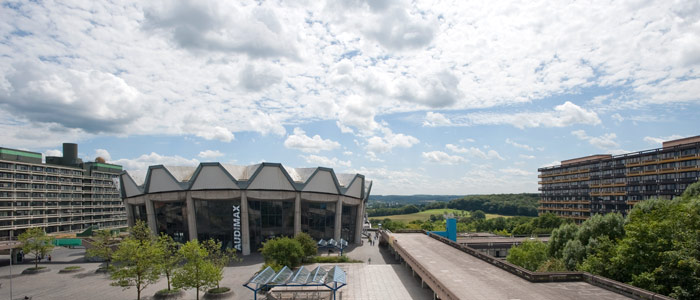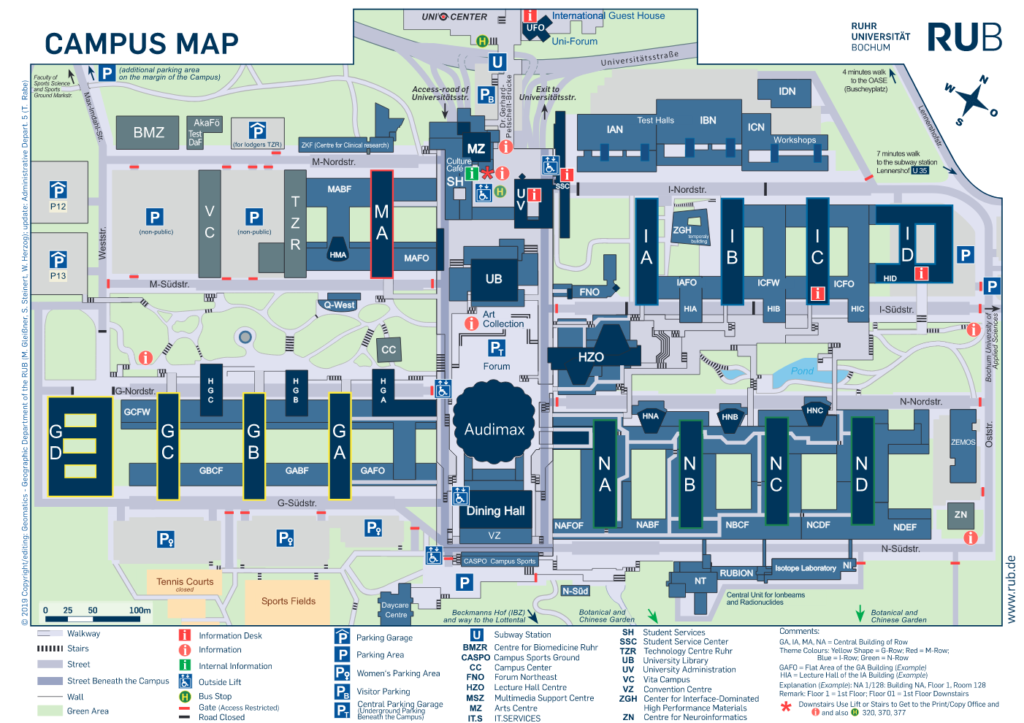
Studying in Bochum

The University
The Ruhr-Universität Bochum (RUB) is one of Germany’s leading research universities. The RUB draws strengths from both the diversity and the proximity of the different scientific disciplines located at a single, coherent campus. This highly dynamic setting enables students and researchers to work across traditional boundaries of academic subjects and faculties. Host to over 40.000 students and about 4.700 staff, the RUB is a vital institution in the Ruhr area, which was selected as the European Capital of Culture for the year 2010. The RUB thus provides not only excellent conditions for interdisciplinary studies, but also on- and off-campus cultural and leisure-time facilities.
Within Bochum, the RUB is divided into three locations: The main campus, the Mark 51°7, and the inner city of Bochum. It is furthermore part of the University Alliance of the Ruhr, providing strong links to the nearby universities of Essen and Dortmund. Every semester, these universities organize multiple seminars and lectures together, and often cooperate in research as well. Other universities the RUB closely cooperates with, particularly in Cognitive Science, include Rutgers University in New Jersey, the University of Cambridge, and the University of Milan.

Campus Life
Built from 1962 to 1974, the Ruhr University was the first newly founded university in Germany after the second world war. Its layout closely follows the British example of a traditional campus university: Both educational and recreational facilities are located on a single patch of land, organized in different buildings for different areas of study. However, in line with the RUB’s ideal of closing the distance between different fields of research, all buildings are interconnected and diverge towards the central hub of the campus called the forum. Here, central facilities such as the university library, the public transport station and the dining hall (Mensa) are located.
In accordance with the important role it plays for both local and international academic life, the RUB is open every day of the week, as is the university library. You may find the opening hours of the library here.
Of course, you can also do various sports on campus, from archery, basketball and rowing all the way to tabletennis and yoga. Those are just a few of the over 100 different sports programs available, you can check out the entire list for yourself here.
However, all of this doesn’t mean that university activity is restricted to the campus only. As part of an effort to make research and teaching more accessible to everyone, the RUB also maintains multiple seminar and exhibition rooms within the city center such as the Blue Square and the Bochumer Fenster. Also, a new part of the campus is currently being built at the location of a former Opel factory, called Mark 51°7. There, scientific research from RUB institutions will support the growth of local startups while enabling students to apply their theoretical skills in practice. One of the buildings at this new location, called THINK, will become a research center for theoretical and integrative neuro- and cognitive science.
The City
The city of Bochum is part of the larger Ruhr area (ca. 5 million inhabitants), which ranks third in Europe in terms of density of cultural events and locations. Other cities in the Ruhr area, such as Essen, Duisburg, Dortmund and Oberhausen are reachable by train in under half an hour, and the main station of Bochum connects it to Germany’s high-speed ICE rail lines. Bochum also has good connections to destinations outside Germany via two international airports in Düsseldorf and Dortmund.
The city itself is home to nearly 370.000 people, living in various districts, each of which has its own unique personality. Close to the university, student life dominates the picture of neighborhoods like Querenburg and Wiemelhausen, while the city center and the district of Langendreer are known for their shops, bars and illustrious nightlife. For those interested in industrial history, the Bergbaumuseum in Hamme or the railway museum in Dahlhausen are definitely worth a visit, while nature enthusiasts will enjoy relaxing at the Kemnader See just south of the campus or strolling through the lush forests of Bochum-Weitmar and -Linden.
Further Information
More information about studying at the RUB can be found at the websites of the registrar’s office and the international office. There is also the Peer Quartier, which offers psychological counseling to any students of the RUB.